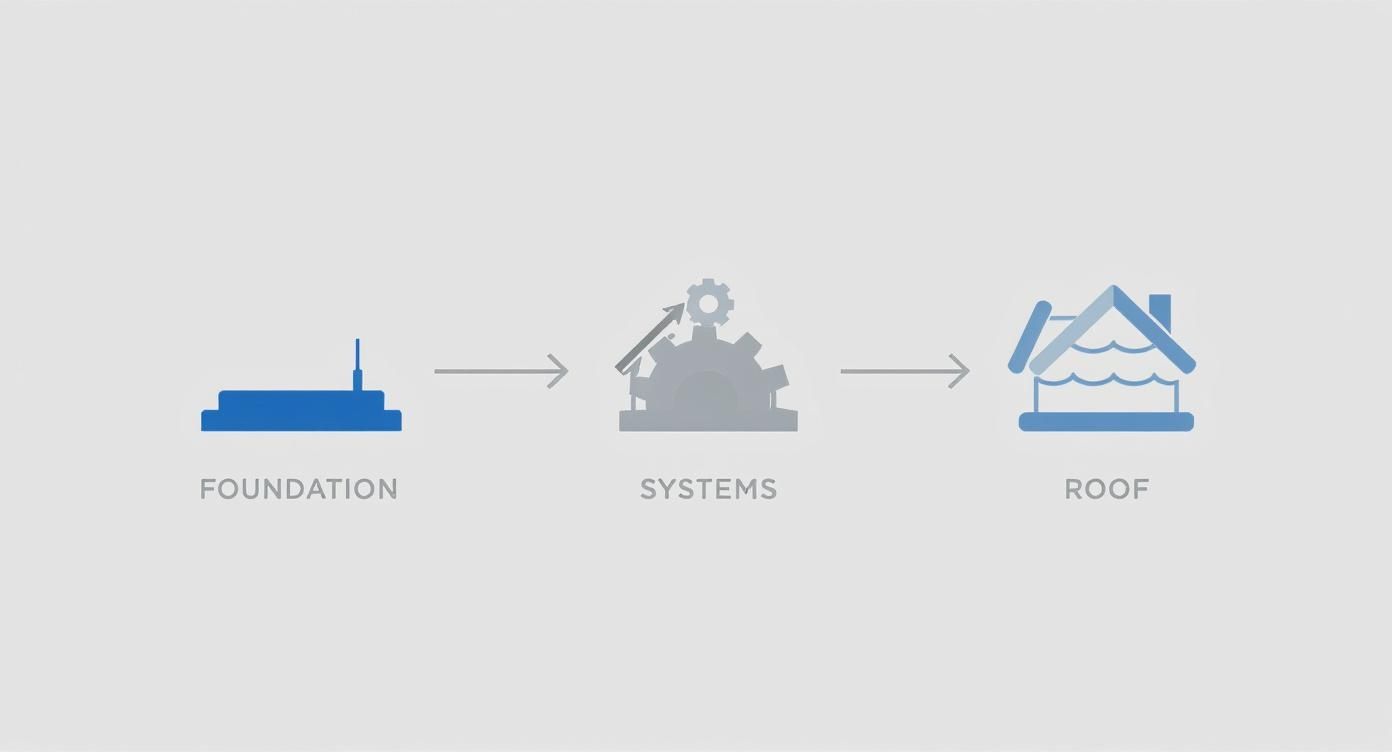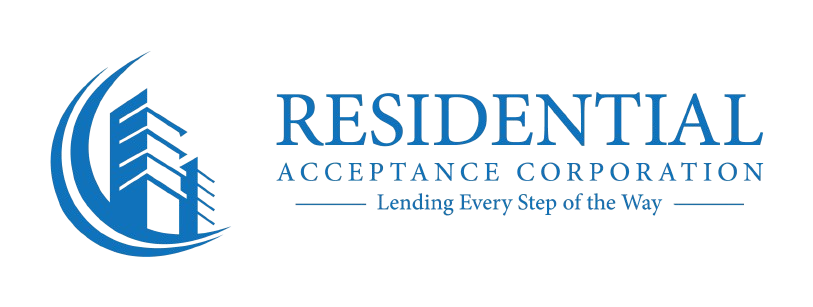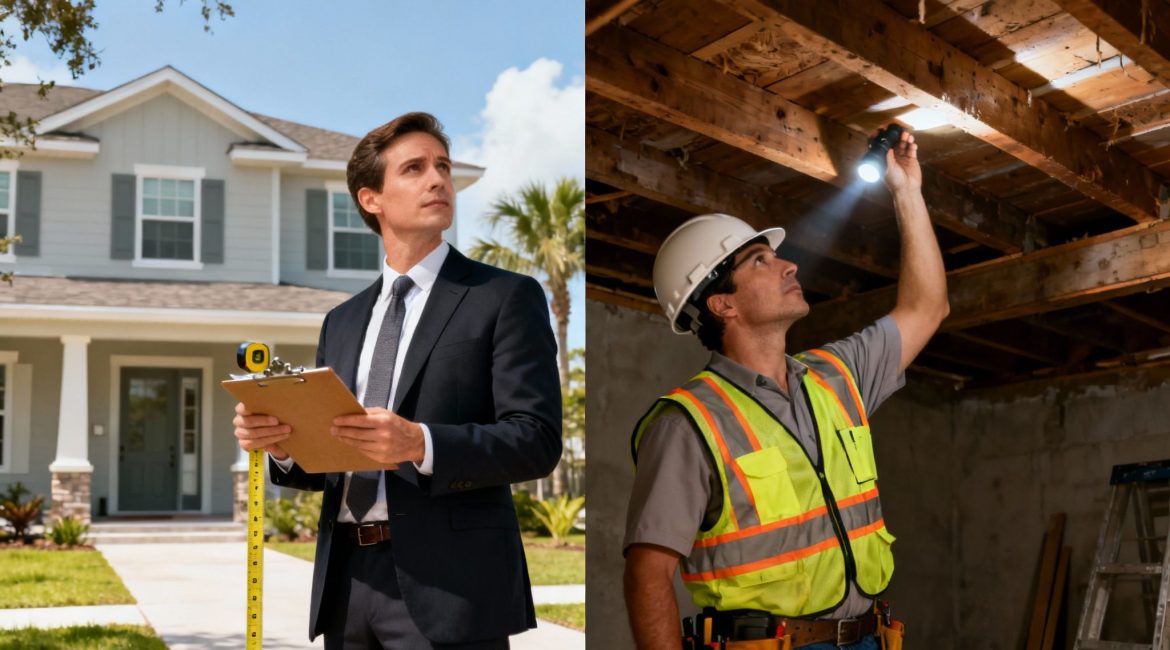If you're buying a home in Tampa, you'll quickly hear the words "appraisal" and "inspection" thrown around. They might sound similar, but they play completely different roles in your home-buying journey. Think of it this way: one is for your lender, and the other is for you.
An appraisal is all about the money. Its job is to determine the home's fair market value to make sure your lender, Residential Acceptance Corporation (RAC Mortgage), isn't loaning you more than the property is actually worth. It’s a crucial step that protects their investment.
An inspection, on the other hand, is all about the house itself. This is where you, the buyer, get a deep dive into the physical condition of the property. A professional inspector goes through the home with a fine-tooth comb to uncover any potential problems, from a leaky roof to a faulty electrical panel, before you sign on the dotted line.
Understanding the Core Differences
Even though they often happen around the same time, the appraisal and the inspection answer very different questions for very different people. The appraisal gives the bank confidence in the loan amount, while the inspection gives you confidence in the home you're about to buy.

A home inspection is your chance to really understand the nuts and bolts of the property. It's an optional step, but highly recommended for anyone buying in Tampa. An inspector will meticulously examine the home’s structure, systems, and major components. This is your best defense against hidden issues that could cost you a fortune down the road.
In fact, overlooking this step can be a major pitfall. A staggering 36% of home sales hit delays, and a huge chunk of those are due to problems discovered during the inspection. This really highlights just how critical that report can be. You can read more about how inspections impact real estate deals to see the full picture.
Here's the simplest way to keep it straight: The appraisal protects the lender's wallet. The inspection protects your future home and your peace of mind.
To make these roles even clearer, let's look at them side-by-side.
Appraisal vs Inspection At a Glance
This table breaks down the fundamental differences between these two critical steps for Tampa home buyers.
| Attribute | Home Appraisal | Home Inspection |
|---|---|---|
| Primary Purpose | To determine the property's fair market value. | To assess the physical condition of the property. |
| Who It Protects | The lender (e.g., RAC Mortgage). | The home buyer. |
| Who Orders It | The buyer's lender. | The home buyer. |
| Is it Required? | Yes, for almost all mortgage loans in Tampa. | Optional, but very highly recommended. |
Ultimately, both are essential safeguards in the real estate process. One ensures the financial viability of the deal, while the other ensures the physical integrity of your potential new home.
The Home Appraisal Process in Tampa
If you’re getting a mortgage in Tampa, an appraisal isn't optional—it's a mandatory step your lender, Residential Acceptance Corporation (RAC Mortgage), will require. The whole point is to get an unbiased, professional opinion on what the property is worth in the current Tampa market. This isn't really for your benefit as the buyer; it's all about protecting the lender's investment.
Think about it from their perspective. The lender needs to be sure that the money they're lending you is backed by a tangible asset of equal or greater value. If, for some reason, you were to default on the loan, they need to know they can sell the home and recoup their money. An appraisal is their financial safety net.
What a Licensed Appraiser Evaluates
The process gets rolling when your lender orders the appraisal through an independent appraisal management company. From there, a state-licensed appraiser is assigned the job. They're a neutral third party, and their only goal is to determine a fair market value based on hard facts and observations.
When the appraiser visits the property, they'll do a complete walkthrough, but they're looking at it with a different eye than you did. They aren't focused on paint colors or light fixtures; they're zeroing in on the tangible characteristics that directly influence value in the Tampa Bay area.
Here’s what’s on their checklist:
- Property Details: They’ll measure the home's total square footage (what's known as gross living area) and confirm the number of bedrooms and bathrooms.
- Overall Condition: The appraiser assesses the home's structural integrity, the quality of its construction, and the general state of both the interior and exterior.
- Features and Upgrades: Major improvements are a big deal. Things like a brand-new roof, a remodeled kitchen, or high-efficiency windows will definitely be noted because they add real value.
- Location and Amenities: They also factor in the neighborhood's quality, how close the home is to schools and parks, and other Tampa-specific amenities that buyers look for.
An appraiser’s job is to see the property through the lens of the market, not through the eyes of a potential homeowner. They focus on quantifiable facts that influence what a typical Tampa buyer would pay.
Analyzing Tampa Market Data
After the on-site visit, the appraiser gets down to the real analytical work: digging into the local Tampa real estate data. This research is perhaps the biggest difference when you consider the appraisal vs inspection of home. An appraiser's final valuation lives and dies by comparable sales, or "comps."
Comps are homes that have sold recently in the Tampa area and are as similar as possible to the one you want to buy—think same neighborhood, similar size, age, and features. The appraiser will find at least three solid comps to create a baseline value. From there, they make adjustments. For example, they might add value if your potential home has a pool that the comps don't, or subtract value if it needs a new AC unit. It's a methodical process of comparison and adjustment.
All these findings are compiled into a formal document called the Uniform Residential Appraisal Report (URAR). This report goes straight to RAC Mortgage, and that final number is what determines your loan-to-value (LTV) ratio and ultimately greenlights your financing. If you're interested in the finer points of this system, understanding how to choose an appraisal management company for your needs can be quite insightful. Ultimately, this detailed report provides the official word on the property's market worth, forming the financial bedrock of your mortgage.
The Home Inspection: Your Eyes and Ears on the Ground
If the appraisal is for the lender, the home inspection is all about you. Think of it as your personal due diligence—a deep dive into the property's physical health, giving you a clear-eyed look at what you’re about to buy in Tampa. It’s your chance to get past the staging and fresh paint to understand the true condition of the home.
A certified home inspector acts as your advocate, methodically examining the home's most critical components. This isn't a simple pass/fail exam. It's an objective investigation designed to uncover existing problems and flag potential headaches down the road. They’re your on-site detective, looking for clues that could affect your wallet, your safety, and your peace of mind.
This process has become so integral to buying a home that the technology behind it is booming, with a rapidly growing global market for home inspection software. This trend just underscores how vital clear, standardized reporting has become for both inspectors and buyers. If you're curious about the tech side, you can discover more insights about home inspection software and see how digital tools are changing the game.
What a Good Inspector Looks For
A thorough inspector follows a checklist, but their real value comes from experience. They know how to spot the subtle signs of trouble. While every Tampa inspection is unique, they will always scrutinize the home’s core systems.
Here’s a glimpse of what’s on their radar:
- Foundation and Structure: They're hunting for cracks, signs of settling, or any hint of water damage in the basement or crawlspace.
- Roofing: The inspector will check the age and condition of shingles, look for damaged flashing, and make sure the gutters are doing their job.
- HVAC Systems: They’ll fire up the heating and air conditioning to confirm they’re functioning properly.
- Plumbing: This involves checking for leaks, testing water pressure, and assessing the age and condition of the water heater and visible pipes.
- Electrical Systems: A close look at the electrical panel, outlets, and visible wiring is crucial for identifying safety hazards.
Sometimes, a general inspection can hint at deeper issues. If the inspector notes signs of moisture or a musty smell, it might be wise to bring in a specialist by finding mold inspection services for a more targeted assessment.
Making Sense of the Inspection Report
Once the walkthrough is complete, you’ll get a comprehensive report, usually packed with photos and detailed notes. This document is your power tool for the next stage of negotiations. The key is learning to separate the minor cosmetic issues from the genuine red flags.
An inspection report isn’t a repair wish list to hand to the seller. It’s an information tool. It gives you the confidence to move forward, the leverage to renegotiate, or the clarity to walk away from a deal that’s not right.
The findings from the report are what give you a leg to stand on. You can use them to ask the seller to handle specific repairs before closing or to negotiate a credit so you can manage the fixes yourself. This is where the appraisal vs inspection of home difference really hits home—the inspection protects your investment from day one by preventing costly, unexpected surprises. And while it's usually your choice, it helps to know if a home inspection is required for a mortgage in certain situations.
When you're navigating the path to buying a home in Tampa, it's easy to get bogged down in the jargon. Two terms you'll hear constantly are "appraisal" and "inspection." While they might sound similar, they serve completely different masters and have very different implications for your purchase.
Let's break down the practical side of things: the costs, the timing, and who’s actually in charge of each process. Getting a handle on these details is key to understanding why one is mandatory for your lender and the other is your personal safety net.
Breaking Down the Costs
Right off the bat, you'll notice a difference in what you pay. A typical home inspection in the Tampa area will run you somewhere between $350 and $550. This cost depends on the home's size and age, and you, the buyer, pay this fee directly to the inspector you've hired.
An appraisal, on the other hand, usually costs a bit more, generally falling between $500 and $800. Although you're the one footing the bill for this too, it's typically bundled into your closing costs. The lender—in this case, Residential Acceptance Corporation (RAC Mortgage)—is the one who orders it from an independent professional.
Who's in the Driver's Seat?
This is where the roles become crystal clear. When it comes to the home inspection, you are in complete control. You get to research and choose the inspector, you schedule the time that works for you, and the final report comes directly to you. It's your exclusive tool for understanding the true condition of the home.
The appraisal process is a different story entirely. Its sole purpose is to protect the lender's investment, so RAC Mortgage will order it from an approved, state-licensed appraiser. This ensures the valuation is completely unbiased. As the buyer, you don't have any input on who performs the appraisal—a regulatory safeguard meant to prevent any conflicts of interest.
The infographic below shows exactly what an inspector is looking for, which is all about protecting you.

As you can see, the inspection is a hands-on, top-to-bottom physical exam of the property, a world away from the appraisal's focus on market data and comparable sales.
Head-to-Head Comparison Appraisal vs Inspection
To make it even clearer, let's put these two critical steps side-by-side. This table highlights the fundamental operational differences that every Tampa homebuyer should understand.
| Factor | Home Appraisal | Home Inspection |
|---|---|---|
| Primary Purpose | To determine the property's fair market value for the lender. | To assess the physical condition and safety of the property for the buyer. |
| Who It Protects | The lender (RAC Mortgage). | The buyer (you). |
| Is it Required? | Almost always required by the lender to secure a mortgage. | Optional, but highly recommended for the buyer's protection. |
| Who Orders It? | The lender orders it through an approved third party. | The buyer hires an inspector of their choice. |
| Typical Cost | $500 – $800 | $350 – $550 |
| What It Covers | Market value based on comparable sales, location, and property features. | Structural integrity, HVAC, plumbing, electrical, roof, and appliances. |
| Final Report | A formal valuation report sent to the lender (you get a copy). | A detailed condition report with photos, sent directly to you. |
Looking at them this way, it's easy to see they are two completely different tools for two different jobs.
A Look at the Timelines
Timing is another crucial piece of the puzzle. You can usually get a home inspection scheduled within a few days, and the inspector will deliver their detailed report within 24 to 48 hours. This speed is vital because it gives you the information you need to negotiate or make decisions during your due diligence period.
An appraisal moves at a slower pace. After RAC Mortgage places the order, it can take anywhere from one to two weeks to receive the final report. The appraiser needs time to visit the home, research recent comparable sales in the Tampa market, and put together their comprehensive valuation.
The appraisal's results have a direct line to your financing, specifically influencing your loan-to-value ratio. If you're interested in the nuts and bolts, you can learn more about how loan-to-value ratios work and see why they play such a huge role in getting your mortgage approved. This difference really cements the distinct roles each process plays on your way to getting the keys to your new home.
How to Handle Appraisal and Inspection Outcomes
This is it—the moment of truth. When those appraisal and inspection reports land in your inbox, you’ll get the objective, expert view you need to move forward with your home purchase. The results can be a green light, confirming you've made a great choice, or they might throw a few curveballs that require some smart decisions.

Good news or bad, the key is knowing what your options are ahead of time. With a clear head and the right strategy, you can handle whatever these reports reveal and keep your purchase on track with your lender, Residential Acceptance Corporation (RAC Mortgage).
When the Appraisal Comes in Low
So, what happens if the appraisal values the home for less than what you offered? This creates what’s known as an "appraisal gap." Since RAC Mortgage will only lend up to the home's official appraised value, that shortfall needs to be addressed. Don't panic—this is a common scenario in the Tampa market, and you have a few solid ways to handle it.
Your first move should be to renegotiate the sales price with the seller. You now have a powerful piece of evidence—the official appraisal report—showing that the home's market value doesn't support the contract price. Most sellers would rather lower the price to match the appraisal than see the deal fall through and start all over.
If the seller won't budge and you still love the home, you can choose to cover the difference in cash. This means bringing more money to the closing table to make up for the gap between the appraised value and the sales price. A third, though less common, option is to formally contest the valuation. This is a long shot, but you can submit additional recent comparable sales to the lender that you feel the appraiser missed.
Navigating the Inspection Report
The inspection report is all about leverage. This isn't about the home's market value; it’s a detailed look at its physical health. The goal isn't to nitpick over cosmetic scuffs but to tackle the big-ticket items that could affect the home's safety, structure, or major systems.
Here’s a practical game plan for reviewing the findings:
- Prioritize Major Issues: Zero in on the serious stuff—a failing HVAC system, a roof nearing the end of its life, outdated electrical wiring, or signs of foundation issues.
- Request Repairs or Credits: You can ask the seller to have specific repairs done before you close. A more popular option is to negotiate a seller credit. This lowers your closing costs, freeing up cash for you to manage the repairs on your own terms after you've moved in.
For example, if the inspection points out dirty air ducts, knowing what that fix entails is key for your negotiation. Getting familiar with the real cost of air duct cleaning helps you ask for a specific, reasonable credit from the seller.
An appraisal gap hits your financing directly, while inspection issues affect your future budget and peace of mind. Both situations call for a calm, fact-based negotiation to find a solution that works for everyone.
At the end of the day, how you handle these outcomes is a defining part of the appraisal vs inspection of home experience. They give you the final, critical details you need to make a smart, confident decision, protecting both you and your lender as you finalize the purchase of your new Tampa home.
Frequently Asked Questions About Home Appraisals vs. Inspections
Even after laying out the key differences between an appraisal and a home inspection, it's natural for Tampa buyers to have a few more questions. Let's tackle some of the most common ones we hear at Residential Acceptance Corporation (RAC Mortgage) so you can move forward with total confidence.
Can a Home Fail an Appraisal?
It’s a common misconception, but a home can't technically "fail" an appraisal. What happens is that the appraiser assigns a market value to the property. The problem arises when that value comes in lower than the price you agreed to pay, creating what we call an appraisal gap.
This doesn't automatically sink the deal, but it does mean we need to find a solution. As your lender, RAC Mortgage can only finance a loan amount up to the home's appraised value. From there, the buyer and seller typically negotiate to bridge the gap—perhaps the seller lowers the price, the buyer brings more cash to the table, or you meet somewhere in the middle.
Should I Attend the Home Inspection?
Yes, without a doubt. If your schedule allows, we always tell Tampa clients to be there for the inspection. You'll receive a detailed report later, but nothing beats walking through the home with the inspector.
Attending the inspection turns a list of findings into a real-world lesson about your potential new home. It’s your chance to see issues with your own eyes, ask questions on the spot, and get a feel for what’s a major problem versus what’s a simple fix.
Think of it as your first, most important home-ownership orientation. Your presence is purely for your own education and won’t affect your mortgage application with RAC Mortgage in any way.
Do I Need Both for a Cash Offer?
If you're paying with cash in Tampa, you get to make the rules. Lenders require an appraisal to protect their investment, but since there's no loan, an appraisal is completely optional for a cash buyer. That said, many still get one just to confirm they’re not overpaying for the property.
The inspection, however, is a different story. We would highly recommend that every buyer, cash or not, get a thorough inspection. It’s your single best defense against discovering hidden, costly problems after you own the place. Skipping it might make your offer look stronger, but it's a huge financial gamble.
How Do New Construction Appraisals Differ?
Appraising a brand-new home in Tampa is a bit of a different ballgame. The biggest challenge is the lack of direct "comps," or identical, recently sold homes right next door. Because of this, appraisers have to get a bit more creative.
They’ll lean heavily on a few key documents:
- The builder’s plans and specs, which detail the layout, materials, and quality of finishes.
- A breakdown of the cost to build, including the land value and all construction expenses.
- Sales data from similar new homes in other, comparable Tampa-area developments nearby.
Essentially, the process shifts from looking backward at historical sales to looking forward at the property's projected value once it's complete.
Navigating appraisals and inspections is a critical part of securing your dream home. At Residential Acceptance Corporation, we guide Tampa-area buyers through every step of the mortgage process with clarity and expertise. Start your application today and let us help you finance your future.

